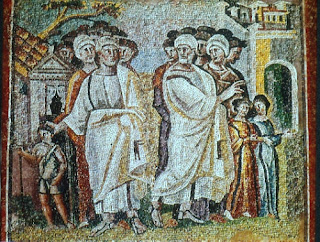 |
| The Parting of Lot and Abraham |
"Never split the party!" A phrase bandied about so much that it now surrounds us in the form of algorithmically generated t-shirts and Facebook memes. It's good advice for roleplaying game neophytes. For a game master, running an RPG group is enough work as is and splitting the players up won't make thing easier.
I agree novice GMs should avoid splitting the party when possible. But what about those of us with a few more campaigns under our belts? Or a few dozen more? There are some stories you can only tell by letting the player characters walk their own paths, at least for a while.
I often see "Never split the party" framed solely in terms of combat. I suspect that has to do with Dungeons & Dragons dominating the medium. But that's not to say its exclusive to RPG's very own 800 pound gorilla. A recurring issue with Shadowrun is the "Pizza Problem," some variation of the idea that while Decker characters cavort in cyberspace,
the rest of the players might as well go out and get dinner, as they have nothing better to do. Even so, I still mostly see "Never split the party" justified entirely by how it affects combat.In systems that are about fighting fantasy monsters or clearing dungeons, separating the party reduces both groups' effectiveness. Its sound logic if you're aiming to survive and "win."
But surviving and winning doesn't always make for the best stories.
That speaks to a deeper issue with the maxim. Splitting the party might make combat more daunting but how does that impact the less martial parts of the story? Think of the last TV show you saw where the main characters are marauding around in one cohesive unit. Big Brother doesn't count. Even the most team centric media still makes a point of having asides and tangents for individual members.
Look at Star Trek: The Next Generation. The crew will be together for certain scenes but there are plenty of B plots, openings, and even entire episodes concerning small groupings or individual members of the cast. Specifically look at the episode Family, where after a traumatic joining with the Borg, Captain Picard uses shore leave on earth to visit his childhood home in France, while Worf and Wesley connect with their own roots aboard the enterprise.
It's a fulfilling episode that offers new depths to the characters, not just because we see them in unfamiliar surroundings but with unfamiliar company too. Family uses that separation to drive the episode's central conflict too, as Picard debating his continued role as captain of the Enterprise feels far more convincing when he's absent from his ship and its crew.
If other media puts "splitting the party" to good use, why should RPGs be the exception?
While avoiding splitting the party is crucial to fighting heavy games like D&D, the idea holds less water the further you venture beyond that. Having the party constantly attached at the hip can suck the oxygen out of dramatic, more personal scene for a specific character or still end up reducing the rest of the party to spectators.
I find myself splitting the party a lot these days. Personal conversations and conspiracy are difficult when everyone's within arm's reach. When planning my New York set Vampire the Masquerade campaign, I found myself wondering how to string a group of very different vampires together and justify their presence in the sensitive areas of rival clans and power bases without just falling into the "superheroes with fangs" trap.
In the end, I gave each player their own concurrent plotline. They inhabited the same setting and big actions affected everyone but it was only towards the very end that their paths crossed. It made navigating such a factionalized, politicking driven setting much easier for everyone and encouraged the players to develop their characters to develop as individuals and not just as "party members."
This campaign turned out to be a success, as were previous sessions where I experimented with having the characters split off to explore personal agendas. But this approach requires a few things.
First, the GM needs to be comfortable planning or improvising multiple concurrent plotlines. Perhaps more importantly, the GM also needs to know how to juggle multiple plotlines without putting too much emphasis on any one player or story thread. Watch how any good TV show or movie handle this, cutting away at opportune moments to create tension or dramatic parallels.
Splitting the party does put a lot of the burden on the players' shoulders too. Not every player can handle the increased focus on their character, whether that's due to being too shy, falling into "main character syndrome," or something else.
The big requirement is that your group needs to be comfortable and entertained watching other players' stories. As with most things, a well established table of close friends can pull that off more easily but it's a big gamble for a newly minted group. The good news is that anyone who's been in a combat heavy campaign is already used to waiting their turn. But make sure your table knows what they're in for first, as many only begrudgingly put with that kind of waiting.
Splitting the party can open up narrative opportunities when handled constructively and in an even handed way. It's a tool I think experienced GMs should consider more often and we should evaluate whether we should tell new RPG players that splitting the party can only lead to disaster and disappointment.
No comments:
Post a Comment